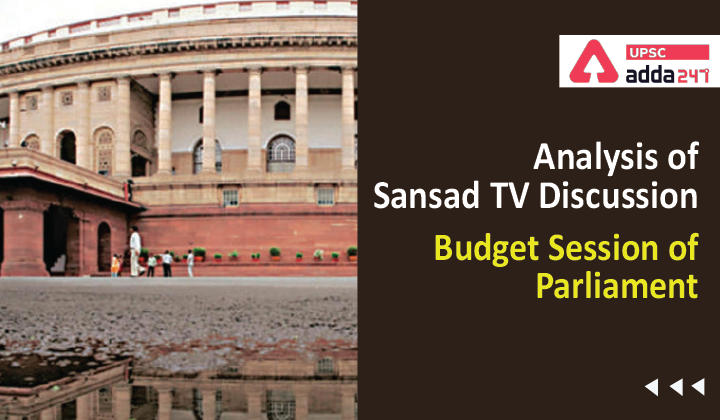Table of Contents
Analysis of Sansad TV Discussion: Budget Session of Parliament
Relevance
”GS 2: Parliament, Indian Constitution”
Introduction
- The first part of the Budget session of Parliament got over on Friday.
- Both Houses will now reassemble on March 14th to sit until 8th April for the second half of the session.
- The first part began on 31st January with President Ram Nath Kovind’s joint address.
- The Union Budget for 2022-23 was presented by Finance Minister Nirmala Sitharaman on 1st February.
- Starting 2nd February until the 11th – both Houses held discussions on the Union Budget and Motion of Thanks to the President’s address.
- In the ensuing second part of the session – from 14th March to 8th April, about 20 items will be taken up.
About Sessions of Parliament
- The power to convene a session of Parliament rests with the government. The decision is taken by the Cabinet Committee on Parliamentary Affairs, which currently comprises nine ministers, including those for Defence, Home, Finance, and Law.
- The decision of the Committee is formalised by the President, in whose name MPs are summoned to meet for a session.
- India does not have a fixed parliamentary calendar. By convention, Parliament meets for three sessions in a year.
- The longest, the Budget Session, starts towards the end of January and concludes by the end of April or the first week of May. The session has a recess so that Parliamentary Committees can discuss the budgetary proposals.
What does the Constitution say?
- The summoning of Parliament is specified in Article 85 of the Constitution. Like many other articles, it is based on a provision of The Government of India Act, 1935.
- This provision specified that the central legislature had to be summoned to meet at least once a year and that not more than 12 months could elapse between two sessions.
History of Budget Sessions
- Until 1994, normally the Parliament used to meet in four sessions in a year, namely Budget session in the months of February-March and April-May; Monsoon session in the months of July-August and Winter session in the months of November-December.
- However, in the years 1961, 1962, 1964, 1976, 1977, 1980, 1985 and 1991, there were five sessions each and in the years 1975 and 1984, there were only three sessions each.
- In the early years during the Budget session, the Parliament used to observe a recess of 2-3 weeks between March and April and the session used to be split into two parts instead of two sessions.
- For instance, the 1st Session of 1952, the 3rd Session of 1953 and the 6th session of 1954, each consisted of two parts.
- Since the 170th Session (Budget session) of 1994, the Budget session is being treated as a continuous one instead of splitting it into two sessions as was the practice before.
- Consequent upon the setting up of the Department-related Parliamentary Standing Committees in 1993, the Budget Session is divided into two parts.
- The relevant rule of the committees provides that after the general discussion on the Budget in the Houses is over, the Houses are to be adjourned for a fixed period and the committees have to consider the Demands for Grants of the related Ministries during the aforesaid period.
Key facts on presenting the Budget
- Union Budget is the ‘Annual Financial Statement’ or the Statement of the Estimated Receipts and Expenditure of the central government before the beginning of each financial year, presented to the Lok Sabha on such day as the President might direct.
- The Union finance minister reads out a ‘Budget Speech’ on that day in the Lok Sabha. The Budget Speech highlights the salient points of the entire Budget that may run into several thousand pages.
- A copy of the Budget is laid in the Rajya Sabha soon after its presentation in the Lok Sabha.
- The preparation and presentation of the Budget for the approval of the legislature is a constitutional obligation on the part of the government, both at the Centre and in the states.
- The Budget session of Parliament is normally held from February to May. During this period, the Budget comes before Parliament for its deliberation, voting and approval; the departmentally related standing committees consider.
- Demands for Grants of ministries/departments and report on the same to the Houses of Parliament.



 TSPSC Group 1 Question Paper 2024, Downl...
TSPSC Group 1 Question Paper 2024, Downl...
 TSPSC Group 1 Answer key 2024 Out, Downl...
TSPSC Group 1 Answer key 2024 Out, Downl...
 UPSC Prelims 2024 Question Paper, Downlo...
UPSC Prelims 2024 Question Paper, Downlo...




